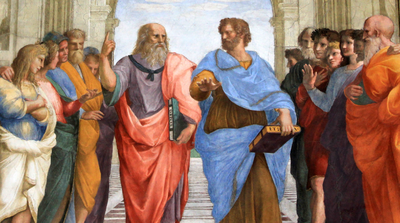
Back نقل الكلاسيكيات اليونانية Arabic Transmissió dels textos clàssics grecs Catalan Transmisión de los textos clásicos griegos Spanish انتقال میراث کلاسیک به اروپای لاتین Persian Transmission del classicos grec Interlingua Transmete de la clasicas elinica LFN Penyebaran karya-karya Klasik Malay لاتيني اروپا ته د کلاسيک میراث لېږدول Pashto/Pushto Yunan Klasiklerinin çevrilmesi Turkish 古希腊著作的流传 Chinese

The transmission of the Greek Classics to Latin Western Europe during the Middle Ages was a key factor in the development of intellectual life in Western Europe.[1] Interest in Greek texts and their availability was scarce in the Latin West during the Early Middle Ages, but as traffic to the East increased, so did Western scholarship.
Classical Greek philosophy consisted of various original works ranging from those from Ancient Greece (e.g. Aristotle) to those Greco-Roman scholars in the classical Roman Empire (e.g. Ptolemy). Though these works were originally written in Greek, for centuries the language of scholarship in the Mediterranean region, many were translated into Syriac, Arabic, and Persian during the Middle Ages and the original Greek versions were often unknown to the West. With increasing Western presence in the East due to the Crusades, and the gradual collapse of the Byzantine Empire during the Late Middle Ages, many Byzantine Greek scholars fled to Western Europe, bringing with them many original Greek manuscripts, and providing impetus for Greek-language education in the West and further translation efforts of Greek scholarship into Latin.[2]
The line between Greek scholarship and Arab scholarship in Western Europe was very blurred during the Middle Ages and the Early Modern Period. Sometimes the concept of the transmission of Greek Classics is often used to refer to the collective knowledge that was obtained from the Arab and Byzantine Empires, regardless of where the knowledge actually originated. However, being once and even twice removed from the original Greek, these Arabic versions were later supplanted by improved, direct translations by Moerbeke and others in the 13th century and after.
- ^ Perry, Marvin; Jacob, Margaret; Jacob, James; Chase, Myrna; Laue, Theodore Von (2008-10-29). Western Civilization: Ideas, Politics, and Society, Comprehensive Edition. Cengage Learning. ISBN 978-0-547-14701-7.
- ^ Alexander. A. Vasiliev. History of the Byzantine Empire